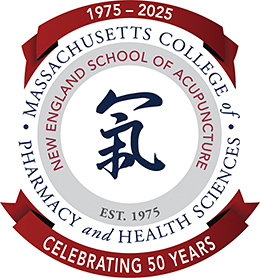The most important relationship I seek to nurture in the treatment room is the one a patient has with their own body. We live in a culture that teaches us to override pain, defer to outside authority, and push through discomfort. Patients often arrive hoping I can “fix” them, but the truth is, we can’t do the work for them. We can offer guidance, insight and support, but healing requires their full participation.
A Milestone in Acupuncture Education
- In 2025, the New England School of Acupuncture – the oldest professional acupuncture school in the U.S. – celebrates its 50th year.
- Dr. James Tin Yau So founded the New England School of Acupuncture in 1975 in Watertown, Mass. He had just a handful of students and offered a one-year diploma program grounded in Chinese medicine philosophy.
- Today, NESA is part of the Massachusetts College of Pharmacy and Health Sciences, where acupuncture students collaborate with other healthcare professions, including nursing, pharmacy, physical therapy, occupational therapy, physician assistant studies, and more.

In 2025, the New England School of Acupuncture – the oldest professional acupuncture school in the U.S. – celebrates its 50th year. To honor the occasion, we reached out to NESA for insight into the school’s roots and how it has evolved – and in the process, helped evolve the profession – over the years.
As NESA celebrates its 50th anniversary, can you give readers a short review of how and why the school came into being? Dr. James Tin Yau So founded the New England School of Acupuncture in 1975 in Watertown, Mass. He had just a handful of students and offered a one-year diploma program grounded in Chinese medicine philosophy. At the time, acupuncture was virtually unknown in the United States, but Dr. So – later deemed the “Father of American Acupuncture” – had a vision to establish academic credibility for acupuncturists and integrate traditional medicine into mainstream healthcare.
Over the years, Dr. So saw this vision realized as NESA became nationally accredited. His diploma program transformed into a master’s degree, incorporating Japanese acupuncture (JAS) and Chinese herbal medicine into the curriculum. NESA led the standard of education for an evolving profession, creating new degree offerings, partnering with prestigious hospitals, and integrating acupuncture into healthcare.
Today, NESA is part of the Massachusetts College of Pharmacy and Health Sciences (MCPHS), where acupuncture students collaborate with other healthcare professions, including nursing, pharmacy, physical therapy, occupational therapy, physician assistant studies, and more. NESA offers two master’s degrees, a doctoral degree, and two graduate certificates. Our graduates run integrative medicine programs across the country.
Can you share a few milestones in the school’s history, particularly as they relate to the profession / traditional medicine education? After its founding, NESA grew rapidly while leading the way in the professionalization of acupuncture education. In 1988, the school received national accreditation. This is the same year the state of Massachusetts began licensing acupuncturists. Our founder, Dr. So, received license No. 1.
In 1994, NESA was authorized to grant a Master of Acupuncture (MAc) degree. That same year, Chinese Herbal Medicine was integrated into the curriculum. With this degree-granting authority, NESA was leading the evolution of traditional medicine education, offering programs with more clinical hours and standardized exams.
In 2006, NESA opened its nearly 30,000 square-foot facility in Newton, Mass. NESA also began forming clinical partnerships with major hospitals, including Tufts Medical Center and Boston Medical Center, bringing acupuncture into major healthcare systems and laying the groundwork for a robust, evidence-informed approach to acupuncture education including research and interprofessional collaboration.
In 2016, NESA merged with MCPHS, marking an important step toward integrating acupuncture into healthcare education. The following year, NESA began offering a Doctor of Acupuncture (DAc), affirming Dr. So’s vision of academic credibility and integrating acupuncture into mainstream healthcare systems. NESA now maintains partnerships and affiliations with the world’s most prestigious hospitals and institutions, including Massachusetts General Hospital, Boston Medical Center, Harvard Medical School, Dana Farber Cancer Institute, Boston Children’s Hospital, and more.
In September 2025, NESA’s story will come full circle as it opens a new treatment center on the MCPHS campus in Boston, offering private and community acupuncture services, as well as Chinese herbal medicine.
What is NESA’s perspective on the current state of acupuncture / traditional medicine education (status, challenges and opportunities)? NESA views the current state of acupuncture and traditional medicine education with optimism as the field continues to gain recognition and integration into mainstream healthcare. Over the years, we’ve seen acupuncture’s growing role in integrative medicine, with increasing public interest and more opportunities for acupuncturists to collaborate with multidisciplinary healthcare teams.
A significant opportunity is the expanding insurance support for acupuncture, especially for pain management and chronic conditions, which is improving accessibility and reinforcing acupuncture as a key part of patient-centered care. However, there are still challenges, such as varying state regulations and the need for standardized educational frameworks.
NESA is well-positioned to lead the profession in addressing these challenges, offering rigorous programs that blend traditional practices with modern clinical care to prepare our graduates for success in an evolving healthcare landscape.
Editor’s Note: To learn more about the New England School of Acupuncture, click here.



